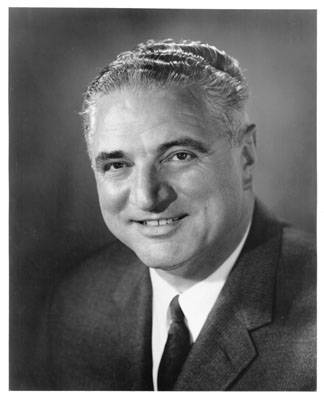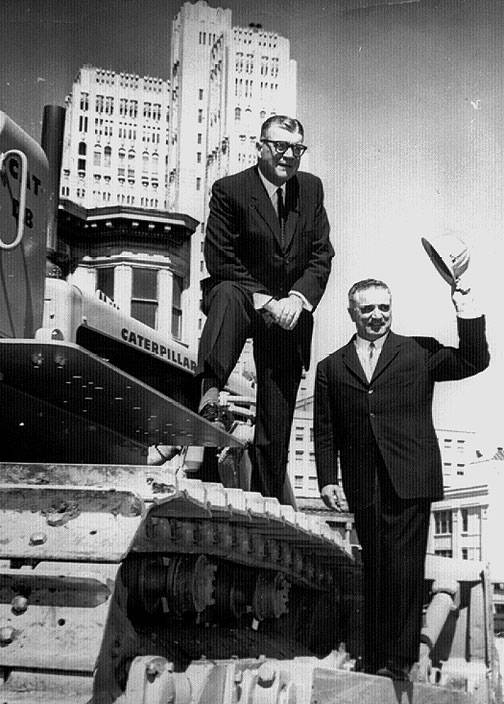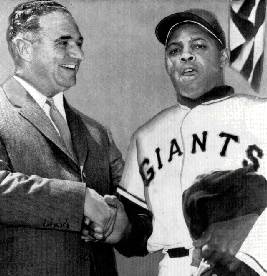Mayor George Christopher
Historical Essay
by Chris Carlsson
Mayor George Christopher
Photo: San Francisco History Center, SF Public Library
Mayor Christopher with the CEO of Pacific Telephone & Telegraph at groundbreaking for 333 Folsom.
Photo: San Francisco History Center, San Francisco Public Library, San Francisco, CA
January 8, 1956—January 8, 1964 Republican owner of a dairy company and member of Board of Supervisors. Took power in 1956 to bring clean government to San Francisco, and brought the Giants baseball team by cutting a deal with a Charles Harney, agreeing on behalf of San Francisco to pay him $2.7 million for 41 acres at Candlestick Point (32-40% higher than fair market value, according to the December 1958 Grand Jury Report).
Christopher was a strong supporter of redevelopment plans as put forth by the Blyth-Zellerbach Committee, San Francisco Planning and Urban Renewal Association (SPUR), throwing his weight behind the Redevelopment Agency, which ultimately approved the hiring of M. Justin Herman as chief. The decision facilitated the swath of community destruction euphemistically called "slum clearance and redevelopment."
Christopher also clamped down on the city's infamous vice trade in sex and gambling, much to the dismay of the thousands of workers in those businesses, as well as in the police force, which found itself with an uncorrupted patrolman for chief and an anti-corruption housecleaning.
Russell Wolden, Christopher's opponent in the 1959 mayoral election, promised to restore San Francisco's former reputation as a "big-hearted, warm" city, then turned around and accused the mayor of allowing the city to become a haven for sexual deviants (i.e., the gays). This incident led to the collapse of Wolden's campaign, as the city's newspapers scolded him for dragging San Francisco's fine name through the mud.
But George Christopher was suppressing one sort of crime in favor of another: massive real estate speculation by the downtown power brokers, and specifically by his good friend Chester MacPhee, the appointed Chief Administrative Officer. Four months after MacPhee's appointment it was revealed that he was a stockholder and director of Del-Camp Investment Corporation, a company that had aggressively purchased 45 buildings in the city's redevelopment zone known as Western Addition A-1, and was demanding exorbitant prices of the city. In George Dorsey's glowing biography Christopher of San Francisco (New York 1962: MacMillan), he describes the process:
"In 1955 [Del-Camp chief executive Angelo] Campana bought a six-story apartment building at 1866 Geary St. The owner, Frederick Kroeger, was ill and in his eighties. He had expected to receive $85,000. But Campana told him "$70,000, take it or leave it.." Unable to manage the property from his hospital bed, he took it. Campana then sold the property to his own company for $130,000. The company then demanded $160,000 from the city's Redevelopment Agency."
CAO MacPhee denied any knowledge of what Del-Camp was doing, claiming he had a very casual role as a director, rarely attending meetings. He soon sold back his stock for the $5K he originally paid. Three months later, in January 1959, it was revealed that City Savings & Loan was dealing heavily in slum properties throughout the city. Again CAO MacPhee was a stockholder and member of the Board of Directors. And again he denied any knowledge of the specific practices of City S&L. But this time, rather than give up his investments, he resigned.
Christopher hosted and became friends with Soviet leader Nikita Kruschev, later visiting him in Moscow. He also went to Burlingame, a suburb 15 miles south of SF, and missed the HUAC RIOT. On the third day of the House UnAmerican Activities Committee hearing at City Hall, his police force evicted the chanting and singing students and protesters with fire hoses across the marble rotunda. Later, when film of the incident appeared in the right-wing propaganda film Operation Abolition, Christopher supported its contention that "known communists" were the instigators.
In 1958, when Giants star centerfielder Willie Mays couldn't buy a house in Miraloma because he was black, Christopher invited Willie to be his guest until he could get a place. Willie got one days later.



